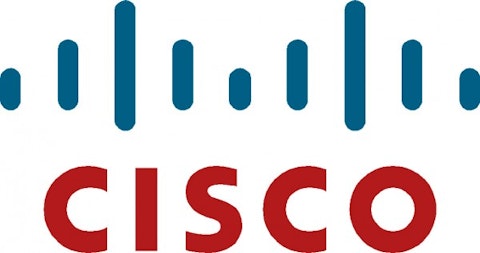Cisco Systems, Inc. (NASDAQ:CSCO) reported record quarterly earnings last week, and the company now holds $46 billion in cash and short-term investments. That’s great news for Cisco. But it’s not great news for the U.S. economy. After earnings were released, CEO John Chambers told CNBC that until the U.S. tax code changes, Cisco is effectively done acquiring U.S. companies and expanding its domestic workforce.
The reason is that Cisco holds the majority of its cash overseas, and bringing it back to America would mean getting bulldozed by the U.S. tax code. “Wherever we acquire is where our head count growth is going to be,” Chambers said. “If the majority of our money remains outside the U.S., and this depends on tax policies, that’s where you’ll see us acquire going forward.”

Cisco’s other option is to keep the money in Switzerland (or whatever country it earns overseas profit in). Not surprisingly, that’s what most global corporations choose to do. As of last March, U.S. companies held about $1.2 trillion in total cash. But almost 60% of that was sitting in foreign bank accounts, according to Moody’s. Some companies hold the vast majority of their loot abroad. About 80% of Oracle Corporation (NASDAQ:ORCL)‘s cash is held overseas. Apple Inc. (NASDAQ:AAPL) holds close to 70% of its cash outside the U.S.
There are two crazy things about the repatriation tax. The first is that it doesn’t raise much money for the U.S. Treasury. Using the most bearish assumptions, The Joint Tax Committee estimates that ending the repatriation tax altogether would raise deficits by about $8 billion per year — a rounding error measured against $2.9 trillion in total revenue. A separate estimate from the Congressional Budget Office shows that ending repatriation taxes would actually raise federal tax revenue, since companies would likely bring more cash home to pay dividends, which are then taxed. Either way, repatriation taxes have a trivial impact on the federal budget.
Second, the repatriation tax is virtually unique to America. Of the G-7 group of nations, only America exercises a repatriation tax. Among the 34 OECD nations, 26 impose a “territorial” tax system, where profits are only taxed where they are earned, with no repatriation owed when earnings are brought back to a company’s home country. Two of the last holdouts, Japan and the United Kingdom, switched to a territorial tax system in 2009. With the competition based in countries that use territorial tax systems, American companies are at a disadvantage. The easiest way for them to compete is to keep foreign profits in foreign bank accounts. The loser is the U.S. economy.
Congress allowed a repatriation holiday in 2004 as part of the American Jobs Creation Act. Corporations brought home more than $300 billion, according to the IRS. Yet with scant evidence that the holiday directly helped create jobs, lawmakers called the one-time deal a failure. Instead, every $1 of extra cash repatriated increased dividends and share buybacks by more than $0.90 — a practice the law prohibited, but one that was nearly impossible to enforce since money is fungible. But so what? More than half of all U.S. households own equities. They benefit far more when corporate cash is used for dividends and share buybacks rather than hoarded in a bank account in Geneva.
The main argument against abandoning the repatriation tax is that it will entice corporations to ship business and jobs to countries that have lower tax rates. But they are already doing that. And it’s a global economy — the majority of S&P 500 earnings growth over the next five years will come from overseas, according to analyst Bob Doll. We can pretend it’s otherwise, or move toward a more competitive tax code.
The article End This Crazy Tax: It Will Boost the Economy originally appeared on Fool.com and is written by Morgan Housel.
Morgan Housel has no position in any stocks mentioned. The Motley Fool recommends Apple and Cisco Systems (NASDAQ:CSCO). The Motley Fool owns shares of Apple and Oracle.
Copyright © 1995 – 2013 The Motley Fool, LLC. All rights reserved. The Motley Fool has a disclosure policy.





